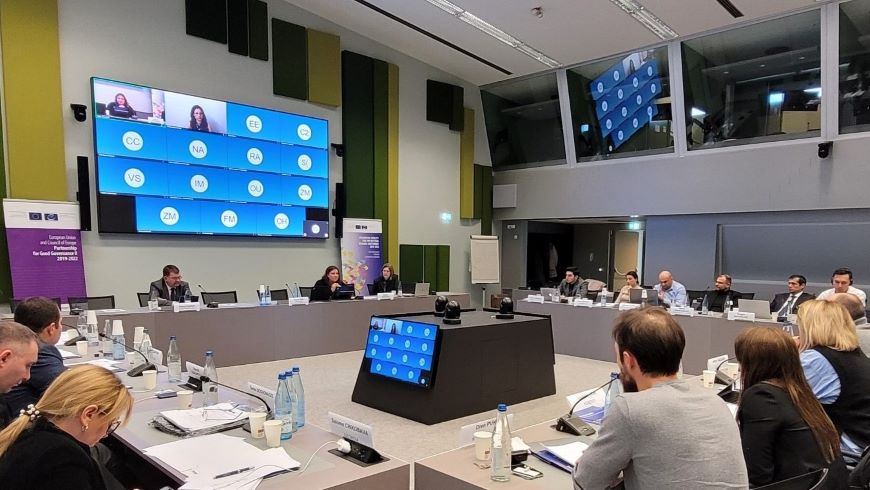Representatives of national authorities involved in the prevention of corruption, money laundering and terrorism financing, and of civil society organisations (CSOs) of the countries of the Eastern Partnership, the Western Balkans and Türkiye, were brought together in an intra-regional workshop on anti-corruption, anti-money laundering and countering the financing of terrorism, in order to reflect on their respective and joint roles and cooperation in preventing and detecting economic crime.
The two-day workshop was organised by the Economic Crime and Cooperation Division of the Council of Europe, as a collaborative event of the joint European Union and Council of Europe Horizontal Facility for the Western Balkans and Türkiye II (HF II) and Partnership for Good Governance II (PGG II) programmes. Both programmes include national projects but also regional components which focus on fostering a consistent approach to the implementation of anti-corruption, anti-money laundering and countering the financing of terrorism (AML/CFT) measures, and seek to address the relevant recommendations of European monitoring bodies GRECO and MONEYVAL for the concerned countries.
In this unprecedented event, fourty representatives from governmental and non-governmental organisations from twelve countries (Albania, Armenia, Azerbaijan, Bosnia and Herzegovina, Georgia, Kosovo*, Moldova, Montenegro, North Macedonia, Serbia, Türkiye and Ukraine) gathered to discuss the role of the non-profit sector and more broadly civil society, in collaboration with concerned public authorities, in the prevention of and fight against economic crime, and to enhance the awareness and practical capacities of all stakeholders in this regard.
This collaboration can indeed take different forms through which civil society actors contribute, from their position, to prevent and detect money laundering, terrorism financing and corruption. It is a key factor of the effectiveness of the national anti-corruption and AML/CFT systems, which tends to be sometimes overlooked.
The international standards, both on AML/CFT and on anti-corruption, are explicit in this regard. In the area of AML/CFT, the Financial Action Tasks Force (FATF)’s Recommendations, in particular Recommendation 8, require that systems are in place to protect the valuable actions of non-profit organisations (NPOs), and prevent their misuse or abuse for money laundering or terrorism financing purposes. In the area of anti-corruption, the United Nations Convention against Corruption (UNCAC) and the Council of Europe’s Conventions on Corruption (whose implementation is monitored by GRECO) acknowledge the role of CSOs in fighting corruption, both on the preventive and repressive side.
The first day of the workshop focused on enhancing capacities of national authorities for assessing and managing money laundering and terrorism financing risks affecting the non-profit sector. The second day focused on enhancing capacities of the CSOs themselves for assessing and mitigating those risks, as well as collaborating with public authorities towards joint objectives to prevent and fight economic crime, including corruption, in the countries of the concerned regions.
The workshop was informed by two technical papers prepared within the two above-mentioned regional projects, one providing advice to national supervisory authorities, and one targeting the NPOs themselves, with guidance on how to assess and mitigate money laundering and terrorism financing risks. Additionally, participants enriched the contents of the workshop by sharing their own experiences, initiatives and ideas on ways to further promote dialogue and develop cooperation between the government and non-governmental sector in the areas of AML/CFT and anti-corruption.
Thoughts were exchanged on how civil society, with the adequate capacities and through appropriate platforms, can indeed provide meaningful contributions to policy formulation, promotion and implementation, access to information, research and knowledge, support whistleblowing systems and other mechanisms for reporting economic crime, monitor performance and results of governments’ actions, and conduct outreach and awareness-raising in these areas of common interest for public benefit.
The results of these discussions will be taken into account in the further work of the Council of Europe, with the aim to enhance the space and role of civil society in future activities and support their involvement in preventing and fighting economic crime – in particular for the next phases of the Partnership for Good Governance (PGGIII) and Horizontal Facility (HFIII) Programmes, starting from 2023.
This intra-regional workshop was organised by the Council of Europe within the joint European Union and Council of Europe Horizontal Facility phase II (HF II) and the Partnership for Good Governance II (PGG II) programmes, which are co-funded by the European Union and the Council of Europe and implemented by the Council of Europe.
* This designation is without prejudice to positions on status and is in line with UNSC 1244 and the ICJ Opinion on the Kosovo Declaration of Independence.



